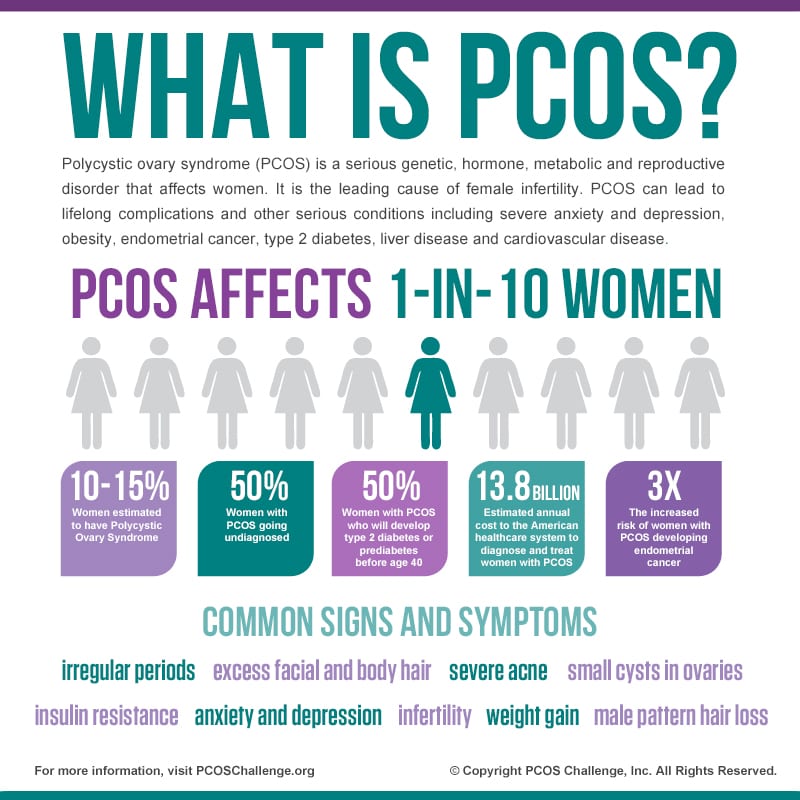Do you experience heavy, irregular periods lasting longer than seven days? Or sometimes no period at all? Do you have more hair on your face and chin than most women you know? And on top of it all, are you struggling to conceive?
If these symptoms sound familiar, you might have Polycystic Ovary Syndrome (PCOS). In honour of PCOS Awareness Month in September, our fertility specialists answer the most common PCOS questions if you suspect you have PCOS or were recently diagnosed.
Living with Polycystic Ovary Syndrome (PCOS)
Polycystic Ovary Syndrome, also known as PCOS, is a condition where your hormones are out of balance. Most women with PCOS have many small benign cysts forming on their ovaries.
Although the fluid-filled cysts themselves typically aren’t harmful, these cysts are the result of a hormonal imbalance that can impact your daily life. PCOS cysts don’t grow, rupture or cause pain like some other ovarian cysts.
However, the hormonal imbalance might prevent you from regularly ovulating, that is when you release an egg from your ovary to be picked up by your fallopian tube. You can also be diagnosed with PCOS without any cysts in your ovaries if you have higher levels of male hormones, called androgens, and irregular periods.
What Women Need to Know About PCOS
If you have PCOS or suspect you do, know you’re not alone. Approximately 1 in 10 of childbearing women experience this common hormonal condition that affects how the ovaries work. Your doctor can diagnose your PCOS by a history, physical exam, ultrasound, and blood tests showing high androgens levels, a male hormone also present in women.
What Does PCOS Feel Like?
Some of the most common signs and symptoms include hair loss on your head, acne, and unwanted hair growth on your face, chin, breasts, back, stomach, or inner thighs. Women with PCOS also report fatigue, oily skin, darkening of the skin at the base of the neck, under arms or breasts, headaches, heavy and irregular periods, and weight gain.
Is PCOS Serious?
If you have PCOS, you might be at an increased risk of developing more severe health problems. Women with PCOS are at risk of having gestational diabetes, type 2 diabetes, high blood pressure, high cholesterol, coronary artery disease, and uterine cancer. Furthermore, women with PCOS might also be more prone to depression and anxiety.
“Because PCOS often results in women not ovulating, this causes an absence of progesterone effect on the lining of the uterus,” explains Dr. Tanya Williams. “Therefore, periods are irregular or absent, and the lining tends to thicken.”
Over time, this can potentially lead to cancer of the uterine lining. The metabolic effects of PCOS can also increase a woman’s chances of developing diabetes in her pregnancy, diabetes later in her life, hypertension, elevated cholesterol, and heart disease.
One way to reduce the risk of these diseases is to try to maintain a healthy diet and regular exercise in an attempt to avoid significant weight gain.
Can PCOS Go Away?
Many women can improve their PCOS symptoms, hormonal imbalance, or metabolic problems by changing their diet. If you suffer from PCOS, an anti-inflammatory diet or a low glycemic index (GI) diet can help. We also recommend patients with PCOS eat a healthy diet filled with natural, unprocessed foods and high-fibre, fatty fish and dark leafy greens.
Diet isn’t the only answer to alleviating PCOS symptoms. Women who aren’t trying to conceive can also get help with their PCOS from exercise, birth control, diabetes medication, or medication for specific acne symptoms.
Can I Conceive and Have a Healthy Pregnancy with PCOS?
Yes! Although PCOS is one of the leading causes of infertility, it’s also one of the most treatable. Given that women with PCOS experience a hormonal imbalance that impacts the growth and release of eggs from the ovaries, you might need fertility treatments.
PCOS accounts for up to 20% of women with infertility. For many women, this causes a lot of stress and anxiety. Consider practicing yoga and meditation to help alleviate some of your stress. Other activities that help with stress reduction include exercise, journaling or writing, and spending time with friends and family.
In preparation for conception, it is important to make sure you are taking folic acid. Dr. Williams advises starting at least 3 months before you start trying to conceive. She recommends additional Vitamin D, Omega-3, and CoEnzyme Q10, as well. Metformin is also often added to help improve the metabolic effects of PCOS.
What are My Fertility Treatment Options if I Have PCOS?
Clomid, one of the most common fertility drugs, is known to help many women with PCOS conceive. Other treatment options include Letrozole and Gonadotropins.
“For women with PCOS who are trying to conceive, the first line of treatment is lifestyle modification, i.e. diet and exercise,” explains Dr. Williams. “I often recommend a low glycemic index diet, with lean protein, lots of fruits and vegetables, and whole grains. It is important to avoid processed foods as much as possible, and avoid fad diets that promise rapid weight loss, and that are not sustainable.”
Moderate intensity exercise for approximately 30 minutes per day is also beneficial. There are no specific exercises that are more or less helpful. Just do something you love to do, whether that is walking, swimming, dancing, or weight training, etc.
Fertility drugs to help you ovulate are the next line of treatment. There are oral and injectable options and the choice depends on a number of factors. If these are unsuccessful, other options include surgery or IVF. Your doctor will discuss the pros and cons of all the options with you when you are ready.
PCOS Questions to Ask Your Doctor
While millions of Canadian women live with PCOS, it’s still necessary to get a diagnosis from your doctor. As previously mentioned, PCOS can be related to more severe health issues and it’s important to know how it impacts your overall health and wellbeing.
Your doctor can answer more specific questions about your PCOS diagnosis. Some PCOS questions to ask your doctor include:
- How can I improve my diet and lifestyle for my PCOS symptoms?
- What is my specific treatment plan for PCOS?
- How will my PCOS affect my family planning?
If you’re curious about how PCOS might affect your fertility and chances of conception, get in touch with Dr. Tanya Williams Fertility Centre by downloading a patient referral form. Infertility investigation and management can help you make an informed decision about growing your family.







